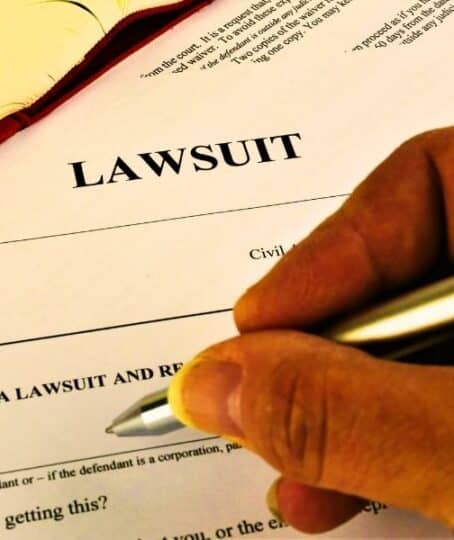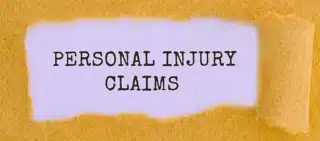
When a Dog Attacks Again and Again If dogs attack once, it’s alarming. When they attack five times, it’s no...


You have the right to file a lawsuit for chronic pain syndrome stemming from an injury, accident, or incident caused by the negligent actions of another person. You must prove that the person had a duty of care towards you, the person acted negligently, the negligence resulted in your injury, and you developed chronic pain from that injury to win a chronic pain syndrome (CPS) claim. Recoverable damages in a CPS claim include medical costs, lost wages or income, and physical pain and emotional distress.

You can sue for chronic pain syndrome arising from an injury caused by another person’s negligence. Chronic pain syndrome can develop directly from personal injury accidents like car accidents, workplace injuries, bicycle accidents, slips and falls, dog bites, or medical malpractice. It can also develop from various injuries caused by personal injury accidents. These injuries include traumatic brain injury (TBI), spinal cord injury, broken or fractured bones, and other severe injuries.
CPS can have debilitating and life-altering effects on you and your family. The high cost of pain management medications, physical therapy, and surgical procedures can leave you financially and emotionally drained. Besides enduring constant physical pain, you might develop other symptoms like anxiety, panic, trouble sleeping, depression, and drug dependency.
You have the right to pursue compensation for the losses or damages caused by your chronic pain. The challenge with chronic pain is that it is hard to link it to a specific source or treatment. Working with a lawyer is your best chance of proving your chronic pain syndrome and maximizing your personal injury settlement.
An in-depth grasp of the law and claims process is an essential part of a successful chronic pain claim. Familiarizing yourself with liability laws, case laws, and other applicable statutes in your chronic pain court case may take years. Time is something you cannot afford to waste when pursuing compensation for your car accident-related chronic pain. Most states, Illinois included, have a two-year deadline for filing injury claims.
Getting legal assistance from a knowledgeable attorney is the best way to file an error-free and compliant claim. Your attorney will discuss all the laws relevant to your case in simple and understandable language. The attorney will also walk you through the chronic pain syndrome claims process, responding to any questions you might have every step of the way.
You will require evidence to build a strong chronic pain lawsuit after a car accident. You will need documentation of your chronic pain. Other evidence linking your chronic pain to a car accident or injuries caused by the car accident will also be necessary. Some of these forms of evidence include:
Imaging tests, such as X-rays and CT scans, can detect the source of pain when you have typical car accident injuries like head trauma. These tests, however, cannot detect chronic pain syndrome. Your medical records and documentation are the best forms of evidence of your constant physical pain. These documents will reveal when your pain began, which should be close to when you got injured in a car accident. Your medical records and documentation could show that you have endured chronic pain since you were injured in a car accident.
A pain journal is a handwritten description of your car crash, injuries sustained, and pain levels. With a detailed, regularly updated pain journal, you will not struggle to recall crucial details about your pain level and its impact on your everyday activities on any specific day. All you need is to check your journal.
It is essential to obtain testimony from a medical practitioner with a demonstrated history of treating the specific car accident injury that might be causing your chronic pain. The medical expert witness will explain how your injury could be causing your chronic pain syndrome.
Pictures of the accident scene can offer a logical view of the crash that can help determine what caused the crash and who was liable. Pictures of injuries will show the type and severity of injuries sustained.
Your attorney will carefully analyze the compiled evidence and information about your case. The attorney will then determine the liable party by asking the right questions. These questions include:
Illinois is an at-fault state with modified comparative laws. The person with a higher share of liability is legally responsible for compensating the other person for the damages suffered. You won’t receive any compensation if it is determined that you were 51% at-fault for the accident. Your percentage of fault will be deducted from your compensation if you were partially at fault for the accident. A seasoned attorney can collect as much evidence as possible to prove the other party held the majority of liability for the accident.
A civil court suit commences when you draft and submit an initial complaint to the court. This written document outlines the claims you are making against the other party, the reasons for making those claims, and the compensation amount you are seeking to restore justice.
Filing a lawsuit for chronic pain syndrome does not prevent you from reaching a settlement agreement with the other party’s insurer. Your attorney will continue with settlement negotiations while still preparing for trial. Your case will go to full trial if settlement negotiations are unfruitful. At trial, your attorney will present evidence, question witnesses, and counter the other side’s arguments to improve your chances of winning.
You might have the right to pursue compensation if you developed chronic pain due to the medical negligence of a healthcare provider. Complex regional pain syndrome (CRPS) is an example of a severe chronic pain condition that you can develop when a doctor departs from the relevant standard of care when performing a routine medical procedure. This life-changing condition was formerly called reflex sympathetic dystrophy (RSD).
Although CRPS can be a side effect of surgery or medical procedure, it can also develop from medical negligence. It can, for instance, stem from an incorrect blood drawing, delays in addressing surgical complications, nerve damage during surgery, or unnecessary surgery. An attorney with an excellent record of winning medical malpractice cases can investigate your case to determine whether your CPRS was caused by medical negligence and advise you on the best course of action.
The attorney can obtain and review all medical records and documents related to your injury. The attorney can find and consult with medical expert witnesses who can link your chronic pain to a specific medical procedure you received.
The attorney can also help you pursue compensation from a doctor who did not diagnose or treat your CRPS on time. Your doctor should have taken reasonable steps to diagnose your condition, despite the challenges of diagnosing chronic pain. The doctor should have, for instance, carefully examined your medical history, asked you about your symptoms, and performed all the necessary tests to diagnose your condition.
Chronic pain conditions like CRPS can also develop from work-related accidents or injuries. You might be entitled to workers’ compensation benefits if you have suffered a work-related chronic pain condition. A CRPS and RDS attorney in Illinois can help you have your chronic pain condition documented and obtain enough evidence to demonstrate your pain is work-related.
You might have grounds to file a lawsuit for chronic pain if you develop chronic pain from an injury caused by someone else’s dog. A dog bite lawyer in Peoria, Illinois, can assemble the evidence required to prove the dog owner's liability. The lawyer can oversee settlement negotiations with the dog owner’s insurer or represent you at trial.
No two chronic pain claims are the same. How much a chronic pain lawsuit is worth can vary significantly from one case to another. The value of your chronic pain claim will depend on the special circumstances of your case, the severity of your chronic pain, and the impact of the chronic pain on your life.
Chronic pain conditions usually last several months or even years and disrupt your daily activities. You might receive substantial compensation if you show that your chronic pain condition stemmed from someone else’s negligence.
Recoverable damages in chronic pain claims fall into two broad categories: special damages and general damages. Special damages cover the financial expenses arising from the chronic pain condition. Lost earnings (present and future), medical expenses (present and future), transportation costs, and home care costs are examples of special damages.
General damages cover intangible losses that do not have a specific dollar value in chronic pain syndrome claims. They include the psychological effects of your chronic pain condition and loss of enjoyment of life.

When a Dog Attacks Again and Again If dogs attack once, it’s alarming. When they attack five times, it’s no...

Overview of the Personal Injury Claim Process in Illinois No one expects to suffer an injury or get involved in...

Exploring Caps on Damages in Illinois Personal Injury Cases Illinois does not have laws capping damages in successful personal injury...